The long and hard-earned history of marriage equality across Europe
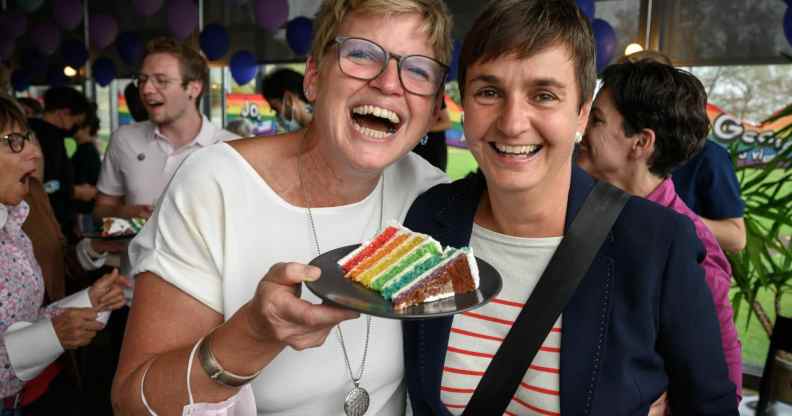
A couple poses with a wedding cake’s slice following the Swiss referendum. (Getty)
As Switzerland becomes the latest country to legalise same-sex marriage, we take a look back at the long, hard-earned history of marriage equality.
Switzerland voted Sunday (26 September) to legalise civil marriage and the right to adopt children for same-sex couples by a nearly two-thirds majority. According to the BBC, justice minister Karin Keller-Sutter said the first same-sex marriages could take place as early as July next year.
“Whoever loves each other and wants to get married will be able to do so, regardless of whether it is two men, two women or a man and a woman,” she added.
Switzerland is the 30th country to legalise same-sex marriage, the BBC says, joining a host of other European nations.
2001 – The Netherlands
The Netherlands became the world’s first country to legalise same-sex marriage in 2001. At the stroke of midnight on 1 April, Job Cohen, the then-mayor of Amsterdam, married three gay couples and one lesbian couple in a joint ceremony at the city hall.
Since that momentous day over 20 years ago, more than 20,000 same-sex couples in the Netherlands have tied the knot, according to data released by Statistics Netherland earlier this year.
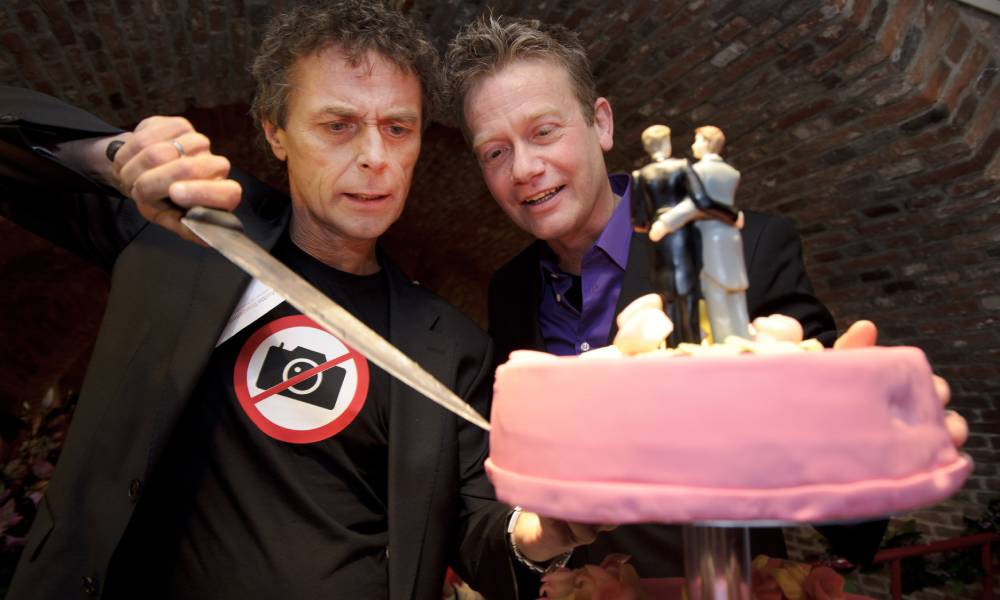
Jan van Breda (L) and his partner Thijs Timmermans cut the cake after their wedding, on 1 April 2011 in Amsterdam. (Photo credit should read EVERT ELZINGA/AFP via Getty Images)
The path to marriage equality was a relatively straight-forward one for the Netherlands. In 1998, the country had enacted a law allowing same-sex couples to register their partnership, which allow couples to claim pensions, social security and inheritances. However same-sex marriage brought greater equality, and was ushered in alongside new adoption rights for queer couples.
The Dutch House of Representatives passed the same-sex marriage bill on 12 September,2000, by a vote of 109 to 33. Public debate at the tie was described at the time as “mainly symbolic”, with only a few Christian parties and smaller right-wing opponents opposing equality.
2003 – Belgium
Two years after the Netherlands approved same-sex marriage, Belgium became the second nation in the world to officially recognise same-sex marriage. CBS News reported the Belgian House of Representatives approved the bill by an overwhelming 91-22 vote.
However, the bill didn’t go as far as to allow same-sex couples the right to adopt children. That would come later in 2006 after the Belgian parliament passed a law that granted same-sex couples the same adoption rights as heterosexual couples.
2005 – Spain
The Spanish parliament voted in 2005 to pass landmark legislation to legalise gave marriage, giving gay couples equal rights to inheritance and allowing them to adopt children. It also granted queer couples the same rights as their straight counterparts when getting divorced.
According to the Guardian, the legislation was fiercely opposed by the Roman Catholic church and conservative leaders. The church so vehemently opposed the bill that it endorsed a protest in which hundreds of thousands of people – including 20 bishops – marched through Madrid opposing the legislation on 18 June.
2009 – Sweden
Same-sex marriage in Sweden has been legal since 2009 following the adoption of a gender-neutral marriage law. According to Reuters, the bill passed in parliament by an overwhelming vote with 261 votes in favour and only 22 opposed.
The government said on its website at the time that the decision meant that “gender no longer has an impact on the ability to marry and that the law on registered partnership is repealed”.
Sweden has previously allowed same-sex couples to enter into a registered partnership in the mid-1990s and then made it legal for queer couples to adopt in 2002.
2010 – Portugal and Iceland
Portugal’s parliament passed a bill in January 2010 that legalised same-sex marriage, and the bill was ratified by then-president Anibal Cavaco Silva in May. The passage of the legislation made the predominantly Catholic country the sixth European nation to recognise same-sex marriages.
In June of that year a lesbian couple, who were mothers and had been together since 2003, were the first same-sex couple to be married in Portugal, the BBC reported.
Shortly after, Iceland followed suit and passed its own same-sex marriage legislation. The Althingi parliament voted 49 to zero in June 2010 to change the wording of existing marriage legislation to include same-sex couples, according to Reuters.
Just a day after the legislation went into force, Iceland’s openly gay prime minister at the time, Johanna Sigurdardottir, married her long-term partner. Sigurdardottir was also the world’s first openly gay head of government.
2012 – Denmark
Denmark was the first country in the world to allow same-sex civil partnerships in 1989, but true marriage equality legislation wouldn’t come for decades. It wasn’t until 2012 that same-sex marriage became legal in Denmark after the parliament voted 85-24 in favour in June that year, the BBC reported.
The law, which took effect on 15 June that year, also permitted same-sex couples to be married in full church ceremonies – not just blessing or civil registrations of partnerships which had been previously allowed.
2014 – England and Wales
As marriage is a devolved legislative matter, different parts of the UK legalised same-sex marriage at different times.
Same-sex marriage was explicitly banned in the 1971 Nullity of Marriage Act in England and Wales. Queer couples would have to wait decades before getting legal recognition after the passing of the Civil Partnership Act in 2004. The bill was introduced by Tony Blair‘s Labour Party and gave same-sex couples in the UK much-needed and long overdue legal recognition. But the fight for full marriage equality continued.
Celia Kitzinger and Sue Wilkinson were an instrumental part of that fight. The British lesbian couple married in British Columbia, Canada, in August 2003, following the legalisation of same-sex marriage in that territory. But when they returned to England, their marriage was only recognised as a civil partnership.
A legal battle ensued, with the couple fighting to be recognised as a married couple by the English legal system. It was a fight they lost on 31 July, 2006, when the High Court ruled against them.
Marriage equality returned to the forefront ahead of the 2010 general election. Nick Clegg, then Lib Dem leader, came out for marriage equality in 2009. He later expanded on this to PinkNews, confirming that “all couples should be able to make that commitment to one another.” Gordon Brown was asked if he’d support same-sex marriage by PinkNews. He said no, and it wouldn’t become Labour policy until after the election, when Ed Milliband became leader.
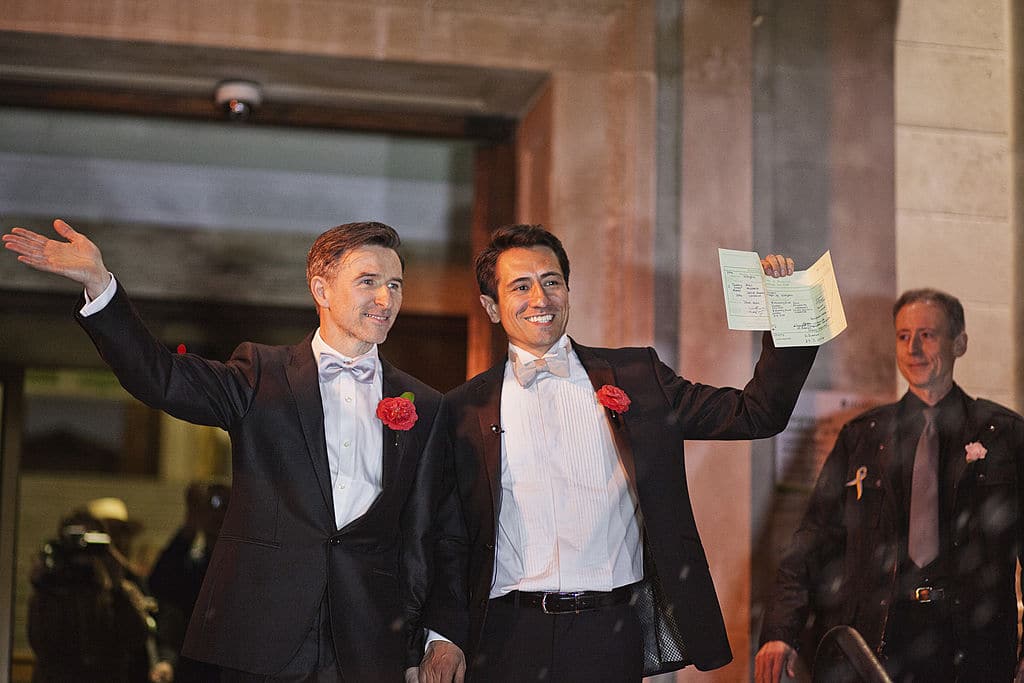
Peter McGraith and David Cabreza became the first same-sex couple to marry after the practice was legalised in England and Wales. (Andrea Baldo/LightRocket via Getty)
A crucial milestone came in February 2010, when David Cameron, then Conservative party leader, told PinkNews readers he’d consider the case if he became prime minister.
Later that year, following the 2010 general election, the Conservatives and the Liberal Democrats formed a coalition and the government, specifically then-minister for equalities Lynne Featherstone (who ultimately became one of the chief architects of marriage equality law), would later launch a public consultation into same-sex marriage, in 2011. That same year, David Cameron expressed his support for same-sex marriage.
In 2012, PinkNews launched the Out4Marriage campaign, which saw figures as diverse as Richard Branson, The Saturdays and Peter Tatchell lobbying for same-sex marriage in videos shared on YouTube. A number of MPs, including Theresa May, Lynne Featherstone and Jack Straw also recorded videos calling for equal marriage.
A heartwarming short film released in April 2012 by award-winning filmmaker Mike Buonaiuto for the Coalition for Equal Marriage campaign, and backed by PinkNews, captured the mood of the nation, amassing more than half a million views in less than one week.
Other politicians instrumental in the fight for equal marriage include lord Nick Herbert, the first openly gay man to be elected for the Conservatives, Tory minister and baroness Tina Stowell, who was responsible for guiding same-sex marriage through the House of Lords, and stalwart Labour MP Yvette Cooper.
Maria Miller, then minister for women and equalities, introduced the Marriage (Same Sex Couples) Bill on 24 January 2013. The law passed successfully through the House of Commons on its second reading by 400 to 175 votes. It later passed through the House of Lords and was granted Royal Assent by Queen Elizabeth II on 17 July 2013, paving the way for queer couples to marry from 29 March, 2014.
2013 – France
The French government voted to pass a bill legalising same-sex marriage and adoption in April 2013, after months of intense debate. Just a day before the legislation was approved, France’s constitutional council threw out a legal challenge by the right-wing opposition, which fiercely opposed the law approving same-sex marriage.
France24 reported the then-president François Hollande had promised “marriage for all” throughout his presidential campaign. After the court’s ruling, he declared it was “now time to respect the law and the Republic”.
2014 – Scotland
A same-sex marriage law was approved by Scottish parliament in February 2014 and received Royal Assent a month later.
It came into effect in December that year with many people being able to convert their existing civil partnerships into marriages, and the first same-sex marriage ceremonies occurred on 31 December.
The Equality Network’s Tom French told the BBC at the time that legalising same-sex marriage was a “huge step forward for LGBTI rights in Scotland, both in terms of equality in the law and the way in which same-sex relationships are viewed in society”
2015 – Luxembourg
Luxembourg also passed same-sex marriage legislation in 2014, with the country’s parliament passing a same-sex marriage bill by a landslide 56-4 vote. The first weddings took place on 1 January, 2015.
In May of that year, Luxembourg’s prime minister, Xavier Bettel, became the first serving EU leader – and second leader in the world – to marry his same-sex partner, Gauthier Destenay. They were among the first couples to benefit from the same-sex legislation going into effect.
2017 – Malta and Germany
Matla’s parliament passed the Marriage Equality Bill, changing select words in the existing Maltese marriage laws to include same-sex couples, in 2017. According to DW, the bill passed in a 66 to 1 vote in parliament with Maltese lawmakers agreeing to replace the words “husband” and “wife” with the gender-neutral “spouse”.
The sole member of parliament to object the bill, Edwin Vassallo, argued it was “morally unacceptable” for him to vote in favour of the bill because of his religious believes.
Germany had recognised same-sex relationships since 2001, but, similar to other countries, this did not grant same-sex couples equal rights with their straight counterparts. The German parliament voted to introduce same-sex marriage legislation in June 2017 just days after the then-chancellor Angela Merkel dropped her opposition vote.
She had previously said that, for her, marriage was between a man and a woman, the BBC reported. But she quickly turned around and said she hoped the passage of the same-sex marriage bill would lead to “social cohesion and peace”.
2019 – Austria
Austria’s constitutional court ruled in 2017 that same-sex couples should have the right to marry from 1 January, 2019.
The ruling came after a female same-sex couple challenged a 2009 law which allowed same-sex couples to enter into a registered partnerships for same-sex couples but not marriage, according to the BBC. This partnership gave same-sex couples fewer rights than marriage.
The Independent reported two Austrian women, Nicole Kopaunik and Daniela Paier, were the first same-sex couple to officially marry in a ceremony in Velden shortly after midnight on 1 January, 2019.
2020 – Northern Ireland becomes last part of the UK to introduce marriage equality
Northern Ireland’s devolved parliament voted for marriage equality in 2015, but the move was blocked by the DUP using a petition of concern.
But in June 2019, while devolution was suspended amid a power-sharing crisis, the House of Commons intervened.
In an historic decision, MPs voted 383-73 in favour of a clause to extend same-sex marriage to Northern Ireland, tabled by Labour MP Conor McGinn.
In January 2020, same-sex couples were able to register to married, and the first ceremonies were able to take place in February that year.
A Belfast couple, Robyn Peoples and Sharni Edwards, made history on 11 February as the first same-sex couple to tie the knot after the legislation took effect in the region. According to PA, the day was also their sixth anniversary as a couple, making it an even more special day.
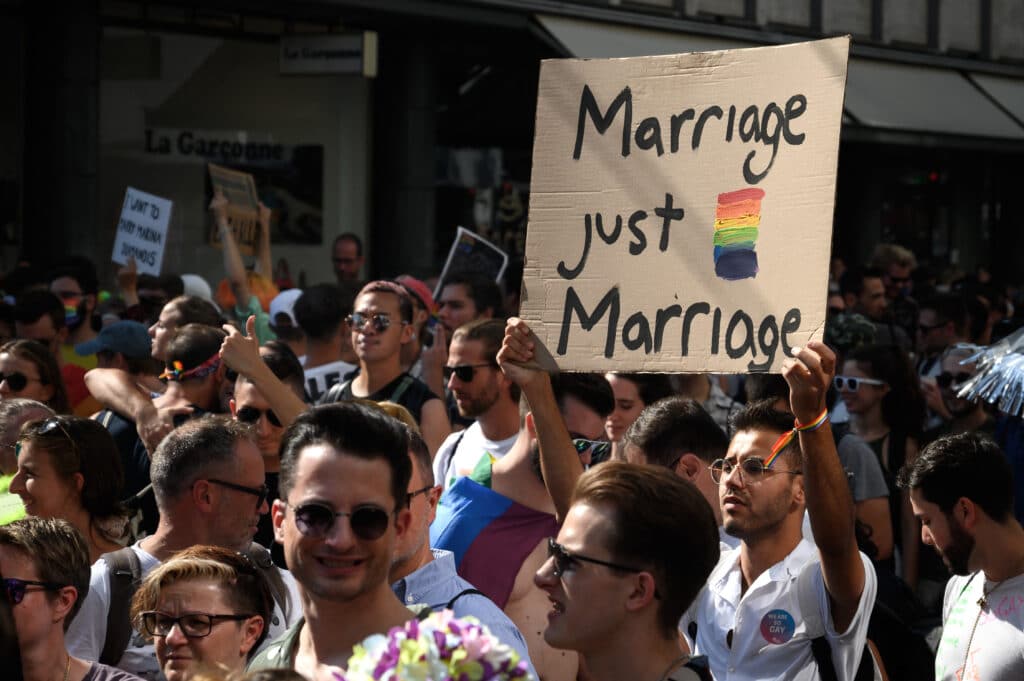
Switzerland’s LGBT+ community marches in Zurich Pride ahead of a nationwide vote on equal marriage (Fabrice Coffrini/AFP/Getty)
Where is same-sex marriage still not legalised in Europe?
One prominent exception in the blanket of same-sex marriage equality in western Europe is Italy, which has historical ties to the Catholic Church. However, Italy began recognising same-sex civil unions in 2016.
Like Italy, several other European countries recognise some form of same-sex unions including civil partnerships. According to the Pew Research Center, this includes Andorra, Croatia, Cyprus, Czech Republic, Greece, Slovenia and Liechtenstein.
Same-sex marriage is still illegal, however, in many European. According to Euronews, Poland and Hungary constitutionally ban same-sex marriage.
Several countries including Ukraine, Russia, Turkey, Albania, Azerbaijan, Bosnia and Herzegovina, Georgia, Belarus, Latvia, Bulgaria and North Macedonia do not recognise same-sex unions at all.
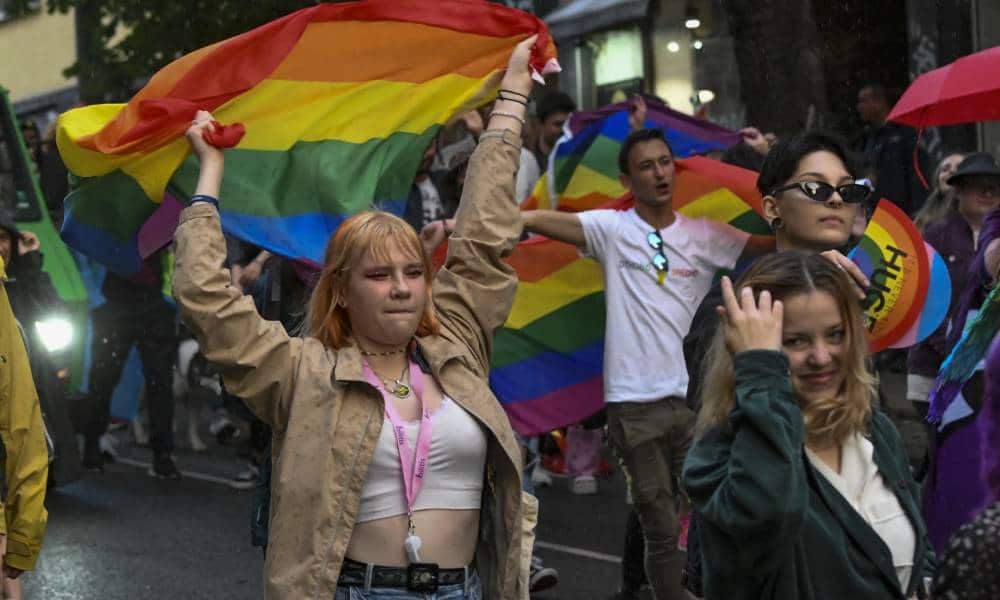
Thousands of people march on the streets during the annual Sofia LGBT Pride parade in Sofia, Bulgaria, 12 June 2021. (Georgi Paleykov/NurPhoto via Getty)
A bill that would have allowed civil unions for same-sex couples in Lithuania failed to clear its first parliamentary hurdle earlier this year. Euronews reported the bill was narrowly defeated after 63 MPs voted in favour of the bill and 58 against – the bill needed 65 votes to move forward.
A referendum seeking to establish a constitutional ban on same-sex marriage in Romania failed in 2018 after being championed by the country’s Orthodox Church. It failed after just a fraction of eligible voters turned up to cast their ballots.
Estonian MPs voted 40-38 to legalise same-sex marriage in 2014, making it the first former Soviet state to do so. The legislation was supposed to come into force in 2016, but the bureaucratic process has impeded the full implementation of the law.

